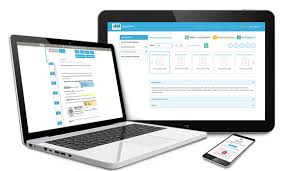This article is intended for educational purposes and not as legal advice. It is always advisable to seek the advice of a licensed attorney regarding the issues discussed in  this article.
this article.
In Colorado, real estate agents have the luxury of generating and signing all of the necessary
purchase documents online. From the offer to the inspection, to the title documents, all of the forms are digital. On the lender side, many lenders also have the ability to generate and sign the full gamut of forms digitally.
With so much of the process being completed online, people continue to ask why the closing process is still paper and ink? The answer generally revolves around security concerns, but changes are in the works. SB 20-096 was passed by the Colorado legislature and signed into law by Governor Polis on June 26, 2020. It will allow Remote Online Notarization (RON) in Colorado on December 31, 2020. In the meantime, the Colorado Secretary of State is establishing guidelines and rules for implementation including credential analysis and ensuring the security of the recordings.
RON allows the notary to notarize documents without being physically present with the signer. It will be used exclusively for electronic records, meaning signed digitally, in contrast to Remote Ink Notarization (RIN). RIN is something of a hybrid between traditional in-person signings and the fully electronic process with RON. RIN allows the notary to appear via video feed rather than be physically present to notarize paper documents as they are signed by the client.  RON has been allowed in many states prior to COVID-19 and any lenders have already implemented electronic loan documents. In Colorado, many lenders have been using electronic documents for the majority of the loan documents, but they have required ink signatures on the note and deed of trust. And, of course, the notary must be present.
RON has been allowed in many states prior to COVID-19 and any lenders have already implemented electronic loan documents. In Colorado, many lenders have been using electronic documents for the majority of the loan documents, but they have required ink signatures on the note and deed of trust. And, of course, the notary must be present.
As we become more accustomed to performing a multitude of our personal and business transactions online, it would seem the transition to online real estate closings would be relatively easy. But a lack of security in this area could have far reaching effects. Critical issues include confirming the identity of the signer(s), assuring documents have not been altered, and recording
the signing ceremony.
SB 20-096 adds new provisions to CRS 24-21-502 specific to RON including, among other things, the use of audio-video communication, credential analysis and the use of a public key certificate which is an electronic credential used to identify the signer. SB 20-096 also modifies CRS 24-21-506 amending the definition of personal appearance to include interacting remotely by means of real-time audio-video communication.
SB 20-096 adds additional definitions to CRS 24-21-514.5 regarding credential analysis and authentication based on dynamic knowledge-based authentication utilizing a set of questions formulated from public and private data sources pursuant to rules adopted by the Secretary of State to further confirm the identity of the signer and allows a Colorado notary public to notarize for individuals not only located in Colorado, but anywhere within the United States and outside the United States if certain conditions are met. However, the notary must be located in Colorado at the time the notarial act is performed. RON will not be allowed for records relating to the electoral process nor for wills and codicils (document that amends a will).
There are many other requirements for the utilization of RON including the notarial act is done in one single, real time session. This is accompanied by requirements regarding verification of the identity of the signer, and the creation and retention of an audio-video recording. Plus, there are new requirements regarding a specific recitation by the Notary Public at the commencement of the recording.
Before a notary public can utilize RON, SB 20-096 requires the notary to notify the Secretary of State and identify each RON system the Notary Public intends to use; the notary must affirm they’ve read and will comply with all rules, and the notary must successfully complete any required training and examination required by the Secretary of State. A Notary Public who performs a remote notarization in addition to retaining the audio/video recording, must also maintain a journal in electronic format.
There are many additional requirements to assure the identity of the signer is authenticated and the recording of the session is retained and secured. If the record is privileged pursuant to section 13-90-107 (1)(b), the corresponding electronic record stored by the RON system remains privileged as well.
Title companies have additional tasks to perform with an online closing. SB 20-096 provides that CRS 10-11-122 adds (4) which is specific to Title commitments and requires title insurance agents or companies to provide a statement substantially as follows: COLORADO NOTARIES MAY REMOTELY NOTARIZE REAL ESTATE DEEDS AND OTHER DOCUMENTSUSING REAL-TIME AUDIO-VIDEO COMMUNICATION TECHNOLOGY. YOU MAY CHOOSE NOT TO USE REMOTE NOTARIZATION FOR ANY DOCUMENT.
Visit www.cherrycreektitle.com to view numerous articles on Colorado real estate topics.

